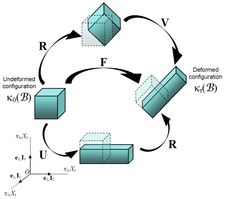
The proof goes as follows. If $\pi$ and $\sigma$ are equivalent, then there exists $T \in GL_n(\mathbb{C})$ such that $T \pi(g) = \sigma(g) T$ for every $g \in G$. Let $T = W \Sigma V^*$ be the singular value decomposition of $T$, so that $T = (W V^*) (V \Sigma V^*)$ is the polar decomposition of $T$. We will show that $A = V \Sigma V^* \pi(g)$ is normal, that is $A^* A = A A^*$. $$\begin{align*}
A A^* &= (V \Sigma V^* \pi(g)) (\pi(g)^* V \Sigma^* V^*) \\
&= \sum |\lambda_i|^2 \\
A^* A &= (\pi(g)^* V \Sigma^* V^*)(V \Sigma V^* \pi(g)) \\
&= \sum |\lambda_i|^2,
\end{align*} $$ where $\lambda_i$ are the diagonal entries of $\Sigma$.
The components of the polar decomposition of a normal matrix commute, so $(V \Sigma V^*) \pi(g) = \pi(g) (V \Sigma V^*)$. Then $$\begin{align*}
T \pi(g) &= \sigma(g) T \\
(W V^*) (V \Sigma V^*) \pi(g) &= \sigma(g) (W V^*) (V \Sigma V^*) \\
(W V^*) \pi(g) (V \Sigma V^*) &= \sigma(g) (W V^*) (V \Sigma V^*) \\
(W V^*) \pi(g) &= \sigma(g) (W V^*).
\end{align*}$$ Since $WV^*$ is unitary by construction, we have completed the proof.



 RSS Feed
RSS Feed
